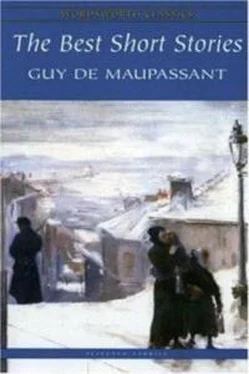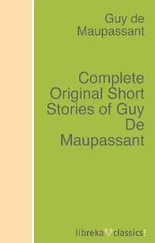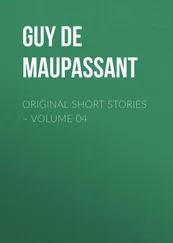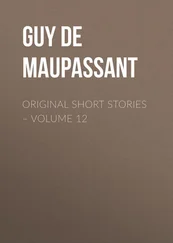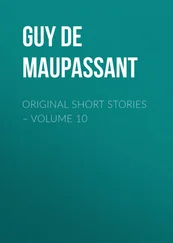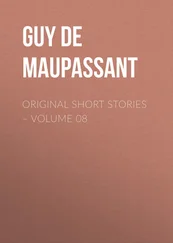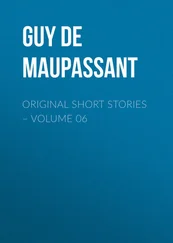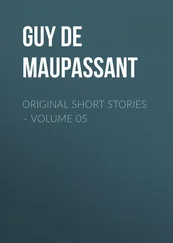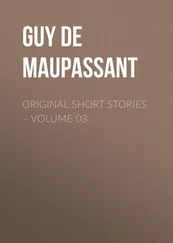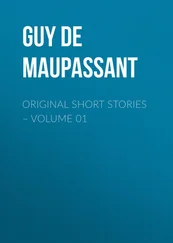This one thought persisted in the mind of the young scamp: "Why feed this horse, which is no longer good for anything?" It seemed to him that this old nag was stealing the food of the others, the goods of man and God, that he was even robbing him, Zidore, who was working.
Then, little by little, each day, the boy began to shorten the length of rope which allowed the horse to graze.
The hungry animal was growing thinner, and starving. Too feeble to break his bonds, he would stretch his head out toward the tall, green, tempting grass, so near that he could smell, and yet so far that he could not touch it.
But one morning Zidore had an idea: it was, not to move Coco any more. He was tired of walking so far for that old skeleton. He came, however, in order to enjoy his vengeance. The beast watched him anxiously. He did not beat him that day. He walked around him with his hands in his pockets. He even pretended to change his place, but he sank the stake in exactly the same hole, and went away overjoyed with his invention.
The horse, seeing him leave, neighed to call him back; but the rascal began to run, leaving him alone, entirely alone in his field, well tied down and without a blade of grass within reach.
Starving, he tried to reach the grass which he could touch with the end of his nose. He got on his knees, stretching out his neck and his long, drooling lips. All in vain. The old animal spent the whole day in useless, terrible efforts. The sight of all that green food, which stretched out on all sides of him, served to increase the gnawing pangs of hunger.
The scamp did not return that day. He wandered through the woods in search of nests.
The next day he appeared upon the scene again. Coco, exhausted, had lain down. When he saw the boy, he got up, expecting at last to have his place changed.
But the little peasant did not even touch the mallet, which was lying on the ground. He came nearer, looked at the animal, threw at his head a clump of earth which flattened out against the white hair, and he started off again, whistling.
The horse remained standing as long as he could see him; then, knowing that his attempts to reach the near–by grass would be hopeless, he once more lay down on his side and closed his eyes.
The following day Zidore did not come.
When he did come at last, he found Coco still stretched out; he saw that he was dead.
Then he remained standing, looking at him, pleased with what he had done, surprised that it should already be all over. He touched him with his foot, lifted one of his legs and then let it drop, sat on him and remained there, his eyes fixed on the grass, thinking of nothing. He returned to the farm, but did not mention the accident, because he wished to wander about at the hours when he used to change the horse's pasture. He went to see him the next day. At his approach some crows flew away. Countless flies were walking over the body and were buzzing around it. When he returned home, he announced the event. The animal was so old that nobody was surprised. The master said to two of the men:
"Take your shovels and dig a hole right where he is."
The men buried the horse at the place where he had died of hunger. And the grass grew thick, green and vigorous, fed by the poor body.
Dead Woman's Secret
The woman had died without pain, quietly, as a woman should whose life had been blameless. Now she was resting in her bed, lying on her back, her eyes closed, her features calm, her long white hair carefully arranged as though she had done it up ten minutes before dying. The whole pale countenance of the dead woman was so collected, so calm, so resigned that one could feel what a sweet soul had lived in that body, what a quiet existence this old soul had led, how easy and pure the death of this parent had been.
Kneeling beside the bed, her son, a magistrate with inflexible principles, and her daughter, Marguerite, known as Sister Eulalie, were weeping as though their hearts would break. She had, from childhood up, armed them with a strict moral code, teaching them religion, without weakness, and duty, without compromise. He, the man, had become a judge and handled the law as a weapon with which he smote the weak ones without pity. She, the girl, influenced by the virtue which had bathed her in this austere family, had become the bride of the Church through her loathing for man.
They had hardly known their father, knowing only that he had made their mother most unhappy, without being told any other details.
The nun was wildly–kissing the dead woman's hand, an ivory hand as white as the large crucifix lying across the bed. On the other side of the long body the other hand seemed still to be holding the sheet in the death grasp; and the sheet had preserved the little creases as a memory of those last movements which precede eternal immobility.
A few light taps on the door caused the two sobbing heads to look up, and the priest, who had just come from dinner, returned. He was red and out of breath from his interrupted digestion, for he had made himself a strong mixture of coffee and brandy in order to combat the fatigue of the last few nights and of the wake which was beginning.
He looked sad, with that assumed sadness of the priest for whom death is a bread winner. He crossed himself and approaching with his professional gesture: "Well, my poor children! I have come to help you pass these last sad hours." But Sister Eulalie suddenly arose. "Thank you, father, but my brother and I prefer to remain alone with her. This is our last chance to see her, and we wish to be together, all three of us, as we—we—used to be when we were small and our poor mo—mother―"
Grief and tears stopped her; she could not continue.
Once more serene, the priest bowed, thinking of his bed. "As you wish, my children." He kneeled, crossed himself, prayed, arose and went out quietly, murmuring: "She was a saint!"
They remained alone, the dead woman and her children. The ticking of the clock, hidden in the shadow, could be heard distinctly, and through the open window drifted in the sweet smell of hay and of woods, together with the soft moonlight. No other noise could be heard over the land except the occasional croaking of the frog or the chirping of some belated insect. An infinite peace, a divine melancholy, a silent serenity surrounded this dead woman, seemed to be breathed out from her and to appease nature itself.
Then the judge, still kneeling, his head buried in the bed clothes, cried in a voice altered by grief and deadened by the sheets and blankets: "Mamma, mamma, mamma!" And his sister, frantically striking her forehead against the woodwork, convulsed, twitching and trembling as in an epileptic fit, moaned: "Jesus, Jesus, mamma, Jesus!" And both of them, shaken by a storm of grief, gasped and choked.
The crisis slowly calmed down and they began to weep quietly, just as on the sea when a calm follows a squall.
A rather long time passed and they arose and looked at their dead. And the memories, those distant memories, yesterday so dear, to–day so torturing, came to their minds with all the little forgotten details, those little intimate familiar details which bring back to life the one who has left. They recalled to each other circumstances, words, smiles, intonations of the mother who was no longer to speak to them. They saw her again happy and calm. They remembered things which she had said, and a little motion of the hand, like beating time, which she often used when emphasizing something important.
And they loved her as they never had loved her before. They measured the depth of their grief, and thus they discovered how lonely they would find themselves.
It was their prop, their guide, their whole youth, all the best part of their lives which was disappearing. It was their bond with life, their mother, their mamma, the connecting link with their forefathers which they would thenceforth miss. They now became solitary, lonely beings; they could no longer look back.
Читать дальше
